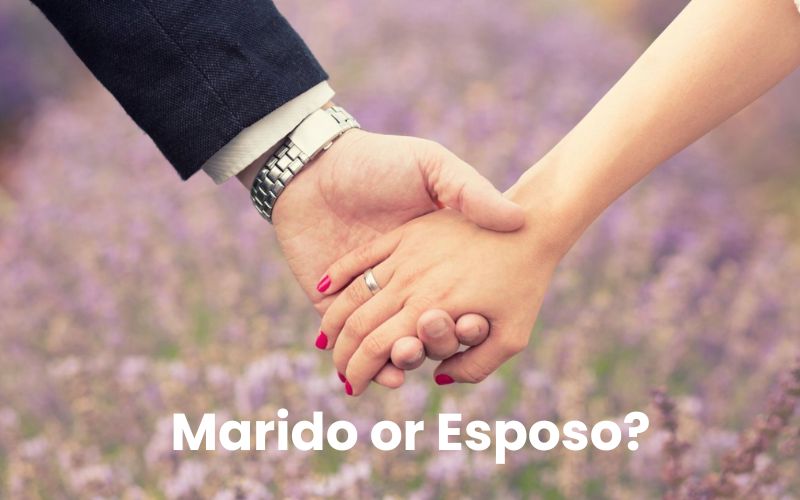Not sure how to say husband in Spanish? Acquire knowledge of everyday vocabulary, slang, professional and informal terminology, translations in many Spanish-speaking nations, and affectionate monikers for your partner. The sort of formality necessary in a particular situation, personal tastes, and geographic location can all influence how either phrase is used. In most circumstances, both terms are appropriate and interchangeable.
Meaning of “Husband” in Spanish
“Esposo” is the Spanish word for a married guy or man in a committed relationship. It is noteworthy that in same-sex marriages and relationships, the term “esposo” can also apply to a male spouse. Likewise, “esposa” is the term for “wife” in Spanish.
How to Say Husband in Spanish?
You can use “esposo” or “marido” to say “husband” in Spanish. Both words are frequently used and broadly understood. Both terms are accurate, and which one is used depends on personal preference as well as regional preferences.
In addition to facilitating clear communication, using the right Spanish terminology to refer to your husband also fortifies the emotional connection between spouses. The words you use to speak to your loved one can express warmth, closeness, and respect, just as in any language.
Husband’s Formal and Informal Terms
In Spanish, there are both official and informal terminology for referring to one’s spouse in addition to the usual ones discussed previously. The word “cónyuge” can be used in formal contexts, when addressing an elderly or authoritative person, or both. This is a gender-neutral term that applies to both wives and husbands. However, you can refer to your spouse as “mi viejo” or “mi marido” in more casual or informal settings.
See also: Captivating New York Instagram Captions
Formal Expressions
In more formal contexts, such government documents, correspondence, or talks with strangers, formal terms are frequently utilized.
Marido
In Spanish, “marido” is another formal phrase meaning “husband.” Like “esposo,” it’s generally recognized and communicates respect. As an illustration, consider this:
Nuestro marido es un apoyo incondicional. (Our husband is an unconditional support.)
Esposo
The most widely used formal word for “husband” in Spanish is “esposo.” It can be used to politely address the husband of another person or to refer to your own husband. As an instance:
Mi esposo es un excelente padre. (My husband is an excellent father)
Informal Expressions
Informal language is usually spoken informally with friends, in intimate relationships, or in casual talks. Informally, you can say “husband” in Spanish in the following ways:
Marido/Mujer
In casual settings, referring to your spouse as “marido” or “mujer” is very popular. Informally, these phrases are also employed while discussing the spouses of other persons. For example:
Voy a visitar a mi mujer al trabajo. (I’m going to visit my wife at work.)
Esposo/Esposa (Esp.)
Native Spanish speakers frequently abbreviate the words “esposo” or “esposa” to “esp” in informal contexts. Younger generations are especially fond of this abbreviation. For example:
Hoy salgo con mi esp. a cenar. (Today I’m going out to dinner with my spouse)
Slang Terms for the Word ‘Husband’
Spanish slang phrases for husbands can give your talks a more casual and loving touch. “Mi media naranja” is one such expression that means “my better half” or “my soulmate.” This phrase, which is frequently used to characterize a loving and committed relationship, expresses a strong emotional connection. “Mi jefe,” which translates to “my boss,” is another widely used slang word. Although it can sound strange in English, in Spanish it’s a phrase of endearment that’s used to show respect and admiration for one’s spouse.
Regional Differences for ‘Husband’
Spanish has regional variations, much like any other language. Although “esposo” is the most often used phrase in Spanish for “husband,” in some regions of South America, you may hear alternatives like “marido” or “marido/marida.”
In certain areas, “marido” is used more commonly in ordinary speech and is thought to be a more informal phrase. As opposed to this, “esposo” is thought to be a more formal and courteous term that is more frequently used in official documents like marriage certificates or court records.
Culture and language are closely related, and in Spanish-speaking societies, special expressions of love are frequently used to commemorate relationships. For instance, you may hear the phrase “mi media naranja” in several Latin American nations, which means “my better half” or “my other half.” This expression emphasizes the concepts of cooperation and completion in a marriage.
How to Use the Correct Term for ‘Husband’?
Think about how formal the circumstances are. In general, it is safe to use “esposo” or “esposa” when in doubt. Pay attention to the phrases native speakers use to describe their own marriages. Consider the surrounding circumstances. There are situations when the degree of formality is determined by the rapport between the speakers.
Conclusion
The power of language to capture the many subtleties of interpersonal connections is what makes it so beautiful. You have a few choices when it comes to addressing your spouse in Spanish, and each has unique emotional and cultural connotations. Your decision conveys the depth of your relationship, whether you go with the straightforward “mi esposo” or the equally meaningful “mi marido,” or travel into the realm of affectionate phrases like “mi amor” and “mi vida.”
When navigating the linguistic terrain of Spanish, keep in mind that the words you use to describe your connection with your husband are more than just words; they are a reflection of your love, respect, and special link. Understanding and appreciating the different ways to say “my husband” in Spanish can lead to deeper appreciation of the cultural depth of the language as well as meaningful communication.





